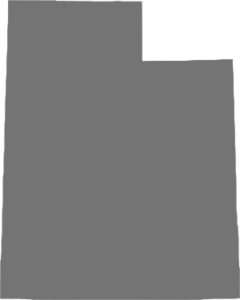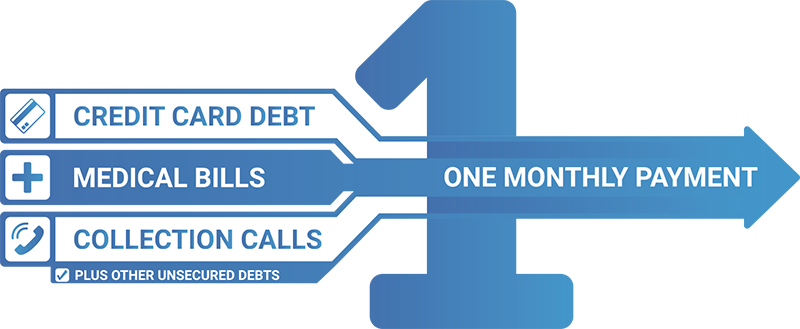Consolidate your debt into one simple monthly payment without a loan, and gain financial stability with our debt consolidation program.
-
Reduce your monthly payments up to 50%
-
Reduce interest rates up to 75%
-
Learn about your debt relief options
-
Pay your debt off sooner
-
Stop late and over-limit fees
-
Stop the collections calls
Get a Free Debt Consolidation Consultation
There is ZERO cost or obligation to you, and may improve your credit score over the duration of the program.
By clicking “Submit” I consent to receive calls and email message offers/information from Debt Reduction Services, Inc. using an autodialer/pre-recorded message at the number I provided. I understand that msg/data rates may apply and that my consent to such communications is not a requirement for purchase. If you would like to stop receiving text messages from DRS, simply reply to a received text with the word STOP.
Reduce your monthly payments up to 50% and pay off your debt faster.
We have already negotiated reduced interest rates with all major creditors and most regional and local lenders in order to assist you in repaying your debt sooner than you would be able to on your own. Often, we’re able to leverage our existing relationships to stop your late and over-limit fees, and even lower your required monthly payments.
How it Works
Step 1.
Talk to one of our certified debt consolidation counselors.
Step 2.
Our preset terms with creditors can get you lower interest rates and payments.
Step 3.
Make just one simple monthly payment to us and we’ll distribute it to your creditors for you.
Reviews and Success Stories
Utah Debt Consolidation
Over 3.5 million people call Utah home, making the state 30th in the nation based on population. Although the overall cost of living is only slightly above average, the housing market is far higher than the rest of the country. This factor could be a heavy contributor to the growing debt many Utah residents struggle with, and why many seek debt consolidation in Utah.
Each year, Utah has seen an uptick in average household debt. In 2024, analysts discovered that average Utah households added over $1,000 in debt, higher than the average household in most other states. What’s more, credit card delinquencies have risen by more than 37% in the last year.
Once you factor in everyday expenses that take up a majority of your budget, it’s easy to see how credit card debt can fall to a low priority. Unfortunately, at that point, high interest rates can quickly rack up your debt even further.
Some cities in Utah are being hit particularly hard by debt. Households in certain cities, such as West Valley City, have a credit card debt totaling $529,519,704, according to a 2024 WalletHub Report. Salt Lake City also appeared on the list of cities with the largest credit card debt increase, coming in at $1,087,020,353. Households are having a difficult time paying down their debt, especially in these cities. As the debt increases over time, the total amount continues to accrue interest.
If you, like many others, have found yourself in a situation where you’re unable to keep up with your debt, it may be time to consider getting help to find a solution. As a non-profit credit counseling agency, we can help guide you toward a path to debt-free living, including through Utah debt consolidation options.
What Is Debt Consolidation?
Debt consolidation is the process of combining multiple debt into one single payment. The goal of the program is to lower your total monthly payments and create a manageable and secure payment structure.
There are two main ways to consolidate debt.
- Debt Consolidation Loan
- You apply for and meet the requirements to get a separate loan that covers your debt. You then owe the loan company one payment.
- Debt Management Program
- An account will be created to keep track of all the balances owed to current creditors. Prior to beginning repayment, a credit counseling agency will negotiate with creditors to reduce interest rates and settle on manageable monthly payments. Once these are set, all payments are totaled, and this amount is withdrawn from your bank account as one monthly payment. The debt management company will then disburse those funds to your creditors on your behalf.
Debt Consolidation Loan vs. Debt Management Program (DMP)
Although these terms are sometimes used interchangeably, there are a few big differences between a debt consolidation loan and a DMP. A debt consolidation loan replaces multiple debts with one new loan. While this may seem like the perfect option to reset your finances and give you a fresh start, loans are not for everyone.
A debt consolidation loan may only be an option for those who can qualify. There is no guarantee of approval or the amount you can be approved for. This means that the amount you can qualify for may not be large enough to cover all of your outstanding balances. Depending on the qualifications you must meet, you may also end up with a high interest rate and longer repayment term. In the end, this solution typically takes longer to clear your debt than other options. Finally, financial counseling is often not included with this option. This means that the habits or situations that pushed you into debt in the first place will not be addressed. This could lead to a recurrence of debt.
In comparison, qualifying for a DMP through a credit counseling agency comes with far less strict qualifications. Through negotiations, this repayment plan will include lower interest rates and a plan to have all included debts paid within five years. Additionally, you will have access to financial guidance. This education provides insight into budgeting, saving, and improving your credit score. With this guidance, you have a much greater chance of staying out of debt once your program is completed.
Debt Consolidation Loan
PROS
- Can obtain a lower interest rate on debt
- Pays off old debt
- Establishes new timeline and monthly payment
CONS
- Must meet credit qualifications for a loan
- Loan may not cover the amount of debt owed
- May come with a higher interest rate
- May take longer to complete consolidation than other options
- May not supply access to financial education
Debt Consolidation Program
PROS
- No minimum credit score requirement
- Obtain a lower interest rate and reduce fees on debt
- Pays off all debt dollar for dollar
- Affordable monthly payments
- Free credit and debt counseling
CONS
- Debts less than $1,000 may be better paid on your own
- Cannot consolidate secured debts (i.e. house, car, etc.)
Why Partner with Debt Reduction Services for Debt Consolidation?
When you’re looking for reliable debt consolidation in Utah that helps you achieve financial freedom, it’s important to choose a partner with both experience and qualifications. With Debt Reduction Services, you’ll have access to certified financial counselors who understand the challenges of managing debt and how to help you overcome them.
Our team stays current with the latest developments in the financial industry to ensure you’re getting effective and up-to-date solutions. Whether you’re dealing with credit card debt, personal loans, or medical bills, we offer tailored strategies that align with your financial goals.
We know there’s no one-size-fits-all solution, which is why our approach to debt consolidation in Utah is built around your individual needs. You’ll always receive support, guidance, and resources from professionals who genuinely care.
You deserve to feel confident in the team guiding your financial future. Take a look at our certifications to see how we’re qualified to help. You can also read our reviews to hear from people we’ve already helped on their debt-free journey.
Utah Debt Consolidation FAQs
What type of debt can be included in debt consolidation?
Only unsecured debt can be included in a debt consolidation program. Unsecured debt is any type of debt not backed by collateral; it includes credit card debt, medical bills, and personal loans. Secured debt includes mortgages and car loans. In those cases, assets can be repossessed or seized if a borrower is incapable of repayment.
What does your credit score need to be for a debt consolidation loan?
This can vary depending on the lender you choose. However, the better your credit score, the better the terms you will receive. If you suffer from a poor credit score, you may not be eligible for a debt consolidation loan, or the terms may not be favorable to your financial situation. A debt management plan is worth considering for those with bad credit, as your credit score is not considered when reviewing your application.
Is debt consolidation bad for my credit score?
Participating in a debt management program in order to consolidate your debt does not directly affect your credit score. A temporary note may be made on your credit report by your current creditors. This simply informs other creditors of your attempt to repay your debt and discourages them from issuing you any new accounts, lines of credit, or loans that may detract from your efforts.
Once you have completed the DMP, this notation is required to be removed. In certain circumstances, when a client enrolls in the DMP and either they or their creditors’ close credit accounts, the client may see a short-term drop in credit score partly due to a change in the ratio of current balance to available credit limit. However, this dip is quickly recovered because of on-time payments which lower debt owed.
Does debt consolidation work on a limited income?
Because qualifying for a loan is typically based in part on income, acquiring a consolidation loan could be difficult on a limited income.
However, consolidating debt through a debt management program requires no minimum income. Aside from a complete inability to pay, credit counseling agencies are willing to work with most incomes to create affordable payments and program participation.
Is consolidating debt a bad idea?
While lenders may be temporarily deterred from lending to someone who has consolidated debt because of closed accounts or credit report notations, these marks will fade, never lasting longer than the repayment program itself.
Lenders will then be more willing to offer credit or loans due to increased credit scores. Many clients are even able to purchase homes shortly after completing their debt repayment.
How do you qualify for debt consolidation?
To qualify for debt consolidation in Utah, you typically need a steady source of income and a substantial amount of unsecured debt, like credit card debt, medical bills, or personal loans. Your credit score might be a consideration, but it won’t necessarily disqualify you—there are solutions for a range of credit profiles.
Do you lose your credit cards after debt consolidation?
You might have to close the credit card accounts included in your consolidation, especially if you’re working on a structured repayment plan. The idea is to help you stay focused on paying off what you owe without adding more debt. Still, the rules can vary depending on how you consolidate.
How much debt is too much to consolidate?
There’s no strict limit, but most consolidation options work best if you owe anywhere from a few thousand to tens of thousands of dollars. If your total debt is exceptionally high and repayment isn’t realistic, it might be worth exploring other solutions, like speaking with a professional about filing for bankruptcy.
Is it hard to get approved for debt consolidation?
Getting approved isn’t necessarily hard, but approval does depend on your financial situation. Lenders typically look at your income, overall debt, and credit score. While a higher credit score can improve your chances, there’s no set minimum, and some options may be available even if your credit needs work.











